 Have you been feeling a bit dizzy lately? Does time feel like it’s been flying by faster than ever? Experiencing ringing in your ears? Seeing flashes of light or fleeting glimpses of things that aren’t there? If you’re not head-over heels in love, pregnant, or smokin’ da ganja, you may be going through what’s known as ascension symptoms. What are they, why are they happening, what do they mean, and will they ever go away? If you’d like answers to questions like these, the latest installment of Layman just might be the prescription you’ve been looking for.
Have you been feeling a bit dizzy lately? Does time feel like it’s been flying by faster than ever? Experiencing ringing in your ears? Seeing flashes of light or fleeting glimpses of things that aren’t there? If you’re not head-over heels in love, pregnant, or smokin’ da ganja, you may be going through what’s known as ascension symptoms. What are they, why are they happening, what do they mean, and will they ever go away? If you’d like answers to questions like these, the latest installment of Layman just might be the prescription you’ve been looking for.
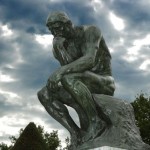 If you’ve ever wondered why we are here, this article is for you. If you’ve never wondered, some part of you has been wondering without your knowledge or else you wouldn’t be reading this now. There’s been a lot written about what life is and what we’re doing here. Some of it is very technical and philosophical. Some of it is very metaphorical and poetic. And then there is the actual answer, which we may never know. However, one truth I’ve noticed about this world is that cycles exist within cycles within cycles. Electrons swirling around a neutron are similar to our planets swirling around the sun. The shape of a leaf is indicative of the shape of the tree it came from. History repeats itself. Myths evolve over time but their basic elements all remain the same. Putting these truths together I was able to trace back to the origins of the first story and, to my shock and awe, uncovered an answer to a question I’ve been wondering for a very long time: why did the universe evolve to become so seemingly complicated? The answer, ironically enough, is incredibly simple.
If you’ve ever wondered why we are here, this article is for you. If you’ve never wondered, some part of you has been wondering without your knowledge or else you wouldn’t be reading this now. There’s been a lot written about what life is and what we’re doing here. Some of it is very technical and philosophical. Some of it is very metaphorical and poetic. And then there is the actual answer, which we may never know. However, one truth I’ve noticed about this world is that cycles exist within cycles within cycles. Electrons swirling around a neutron are similar to our planets swirling around the sun. The shape of a leaf is indicative of the shape of the tree it came from. History repeats itself. Myths evolve over time but their basic elements all remain the same. Putting these truths together I was able to trace back to the origins of the first story and, to my shock and awe, uncovered an answer to a question I’ve been wondering for a very long time: why did the universe evolve to become so seemingly complicated? The answer, ironically enough, is incredibly simple.
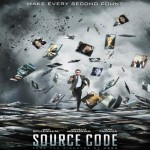 As mentioned in last quarter’s column, there have been a lot of “life-as-illusion” themed movies coming out lately. While I suspect that the success of Avatar and Lost are partly responsible for this trend, I think people’s fascination with 2012, drastic world changes, and a surge in our search for meaning are also fueling the recent string of films about alternate realities and simulated worlds. When airplanes are crashing into buildings, cities are submerged underwater, the Middle East is revolting, and the world economy is collapsing, real life almost seems more fantastical than our dreams. Jon Stewart summed it up perfectly at the 2008 Academy Awards: “Normally, when you see a black man or a woman president, an asteroid is about to hit the Statue of Liberty.” Yes, we are now officially living in the future, and we all know what kind of stuff happens in the future—exactly the kind of stuff that’s happening right now. But at least, thanks to Hollywood, we’ve been warned. And Hollywood’s heads up may even go much deeper than prophesies of events to come. They may help explain the reality we all find ourselves in.
As mentioned in last quarter’s column, there have been a lot of “life-as-illusion” themed movies coming out lately. While I suspect that the success of Avatar and Lost are partly responsible for this trend, I think people’s fascination with 2012, drastic world changes, and a surge in our search for meaning are also fueling the recent string of films about alternate realities and simulated worlds. When airplanes are crashing into buildings, cities are submerged underwater, the Middle East is revolting, and the world economy is collapsing, real life almost seems more fantastical than our dreams. Jon Stewart summed it up perfectly at the 2008 Academy Awards: “Normally, when you see a black man or a woman president, an asteroid is about to hit the Statue of Liberty.” Yes, we are now officially living in the future, and we all know what kind of stuff happens in the future—exactly the kind of stuff that’s happening right now. But at least, thanks to Hollywood, we’ve been warned. And Hollywood’s heads up may even go much deeper than prophesies of events to come. They may help explain the reality we all find ourselves in.
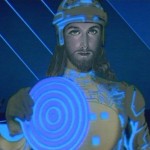 In anticipation of TRON: Legacy, I recently re-watched a bunch of simulation-world films including The Thirteenth Floor, eXistenZ, and the original TRON, which I hadn’t seen in over twenty-five years. While I remember being somewhat confused watching the futuristic Disney film as a kid, seeing it again with new eyes, I was amazed at how clearly it expressed the “life as illusion” theme I’ve been so fascinated by as an adult. In the original movie, Jeff Bridges is considered a “user.” While Bridges often plays users in his films, in this case, it refers to a computer user who manipulates the scenarios of a digital world that is very similar to our own. In the original film, users are considered mythical, messianic figures who can help free the programs from the game they find themselves in. This got me thinking.
In anticipation of TRON: Legacy, I recently re-watched a bunch of simulation-world films including The Thirteenth Floor, eXistenZ, and the original TRON, which I hadn’t seen in over twenty-five years. While I remember being somewhat confused watching the futuristic Disney film as a kid, seeing it again with new eyes, I was amazed at how clearly it expressed the “life as illusion” theme I’ve been so fascinated by as an adult. In the original movie, Jeff Bridges is considered a “user.” While Bridges often plays users in his films, in this case, it refers to a computer user who manipulates the scenarios of a digital world that is very similar to our own. In the original film, users are considered mythical, messianic figures who can help free the programs from the game they find themselves in. This got me thinking.
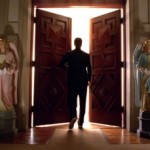 Lost is dead. Long live Lost. And so it ends, in much the same way it began—with a close-up of Jack’s eye, staring straight up past the tall stalks of bamboo that circled the sky above. This time however, that eye would close, and with it, our six-season journey that took us right back to where we started—with questions about a mysterious show that seemed to parallel the mysteries of life. For some, the journey was far more compelling than the destination. For others, it was the perfect resolution and they can walk away feeling fulfilled. Whatever you thought about the conclusion, the one thing most viewers can agree on is that the show challenged us to think in ways we might not have otherwise. In short, Lost was a real trip. And what a long, strange trip it’s been.
Lost is dead. Long live Lost. And so it ends, in much the same way it began—with a close-up of Jack’s eye, staring straight up past the tall stalks of bamboo that circled the sky above. This time however, that eye would close, and with it, our six-season journey that took us right back to where we started—with questions about a mysterious show that seemed to parallel the mysteries of life. For some, the journey was far more compelling than the destination. For others, it was the perfect resolution and they can walk away feeling fulfilled. Whatever you thought about the conclusion, the one thing most viewers can agree on is that the show challenged us to think in ways we might not have otherwise. In short, Lost was a real trip. And what a long, strange trip it’s been.
 In “Across the Sea,” Lost finally gives us the origins story for Jacob and the Man In Black. The episode was pure, 100% mythology. Those who watched the episode based on the surface story alone were probably disappointed. Let’s face it, taken literally, myths are silly: talking snakes, little boys defeating giants, jealous gods, immaculate conceptions, mortals with superpowers, a sword stuck in a stone, the Force, Never Never Land, Wonderland, Oz, the Matrix, the Island. On the surface, all myths seem like children’s stories. It’s only when we dig deeper that we find the truth worthy of a wise old soul—a soul that knows where it really came from.
In “Across the Sea,” Lost finally gives us the origins story for Jacob and the Man In Black. The episode was pure, 100% mythology. Those who watched the episode based on the surface story alone were probably disappointed. Let’s face it, taken literally, myths are silly: talking snakes, little boys defeating giants, jealous gods, immaculate conceptions, mortals with superpowers, a sword stuck in a stone, the Force, Never Never Land, Wonderland, Oz, the Matrix, the Island. On the surface, all myths seem like children’s stories. It’s only when we dig deeper that we find the truth worthy of a wise old soul—a soul that knows where it really came from.
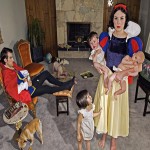 Once upon a time, you believed that you were very special. That you’d grow up to make a difference in the world, be paid handsomely for doing so, find true love, have some equally special children, and live happily ever after. Unfortunately, life hasn’t worked out quite as good as the fairytale. So, were we all lied to? In Lost’s “Happily Ever After” Desmond discovers that there is a reality where all his dreams can come true. So where is this reality and do we need to be as special as Desmond to get there?
Once upon a time, you believed that you were very special. That you’d grow up to make a difference in the world, be paid handsomely for doing so, find true love, have some equally special children, and live happily ever after. Unfortunately, life hasn’t worked out quite as good as the fairytale. So, were we all lied to? In Lost’s “Happily Ever After” Desmond discovers that there is a reality where all his dreams can come true. So where is this reality and do we need to be as special as Desmond to get there?
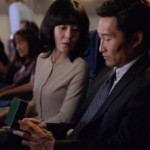 In “The Package” Jin is distraught over having his $25,000 confiscated at the airport, Sun is panicked that her lavish bank account was emptied by her father, Widmore is angry that events aren’t going according to plan, and Desmond didn’t seem particularly happy about being drugged, stuffed in a sub, and brought back to the island. But if there’s anything that life and Lost teach us, it’s that our plans aren’t always in our own best interest. They say that man plans and God laughs. The question is, is God laughing with us, or at us?
In “The Package” Jin is distraught over having his $25,000 confiscated at the airport, Sun is panicked that her lavish bank account was emptied by her father, Widmore is angry that events aren’t going according to plan, and Desmond didn’t seem particularly happy about being drugged, stuffed in a sub, and brought back to the island. But if there’s anything that life and Lost teach us, it’s that our plans aren’t always in our own best interest. They say that man plans and God laughs. The question is, is God laughing with us, or at us?
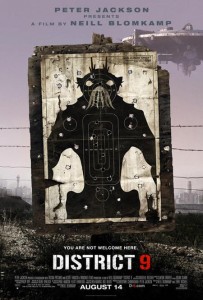 Nobody deserves to suffer. But perhaps we could all use some challenging times to help us grow so we might reach the next level. Maybe the universe is just breaking us down so we can be mended, nudging us towards a more united world. Perhaps this is all preparing us for whatever is to come in 2012 or beyond—the challenges that we may not be ready for now, but after several more beatings will be tough enough to handle. Let’s face it; we’ve become soft, spoiled, greedy, selfish, and lazy. We are just like the pompous Roman rulers before the fall of their empire or the snooty noble class before the French Revolution. In effect, we have become the bad guys.
Nobody deserves to suffer. But perhaps we could all use some challenging times to help us grow so we might reach the next level. Maybe the universe is just breaking us down so we can be mended, nudging us towards a more united world. Perhaps this is all preparing us for whatever is to come in 2012 or beyond—the challenges that we may not be ready for now, but after several more beatings will be tough enough to handle. Let’s face it; we’ve become soft, spoiled, greedy, selfish, and lazy. We are just like the pompous Roman rulers before the fall of their empire or the snooty noble class before the French Revolution. In effect, we have become the bad guys.
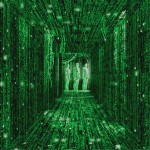 When I first saw The Matrix back in 1999, I instantly became fascinated with its “virtual reality world” concept. At the time, and for many years afterwards, I saw the theme as a metaphor for the illusionary material world we live in—a world of time, space, and the assumption that we are all separate individuals. My belief, in line with what I had taken from kabbalah, was that in reality, we were all one united energy force. Call it God, the light, Buddha, Allah, the universe, sentient energy, whatever. The point was that this energy created our illusionary world in order to experience itself. After all, since it was an all-knowing, all-powerful energy, existence was pretty boring. This energy wanted to experience the one thing it couldn’t know: what it was like to not be it. So, it created an imaginary world of time and space and separated itself there into different material elements that eventually evolved into human beings.
When I first saw The Matrix back in 1999, I instantly became fascinated with its “virtual reality world” concept. At the time, and for many years afterwards, I saw the theme as a metaphor for the illusionary material world we live in—a world of time, space, and the assumption that we are all separate individuals. My belief, in line with what I had taken from kabbalah, was that in reality, we were all one united energy force. Call it God, the light, Buddha, Allah, the universe, sentient energy, whatever. The point was that this energy created our illusionary world in order to experience itself. After all, since it was an all-knowing, all-powerful energy, existence was pretty boring. This energy wanted to experience the one thing it couldn’t know: what it was like to not be it. So, it created an imaginary world of time and space and separated itself there into different material elements that eventually evolved into human beings.
 Have you been feeling a bit dizzy lately? Does time feel like it’s been flying by faster than ever? Experiencing ringing in your ears? Seeing flashes of light or fleeting glimpses of things that aren’t there? If you’re not head-over heels in love, pregnant, or smokin’ da ganja, you may be going through what’s known as ascension symptoms. What are they, why are they happening, what do they mean, and will they ever go away? If you’d like answers to questions like these, the latest installment of Layman just might be the prescription you’ve been looking for.
Have you been feeling a bit dizzy lately? Does time feel like it’s been flying by faster than ever? Experiencing ringing in your ears? Seeing flashes of light or fleeting glimpses of things that aren’t there? If you’re not head-over heels in love, pregnant, or smokin’ da ganja, you may be going through what’s known as ascension symptoms. What are they, why are they happening, what do they mean, and will they ever go away? If you’d like answers to questions like these, the latest installment of Layman just might be the prescription you’ve been looking for.









